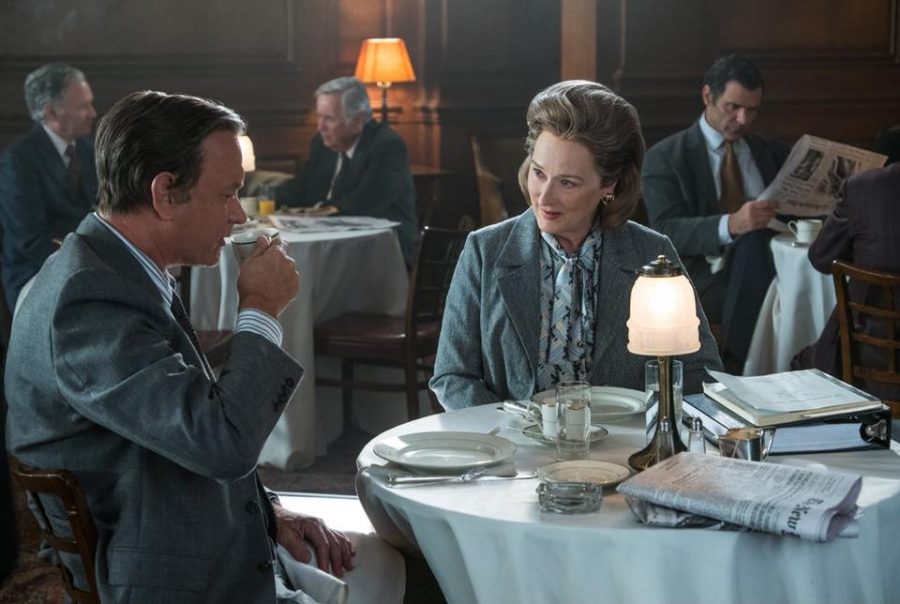Just a few years ago, Tom McCarthy took his star-studded drama-thriller, “Spotlight,” to win Best Picture at the 2015 Oscars. With the heartfelt performances of Michael Keaton, Mark Ruffalo and Rachel McAdams, we were introduced to brilliantly balanced moral and personal contentions, which created a riveting and thought-provoking take on the importance of freedom of press. Three years later, we have Steven Spielberg’s “The Post,” starring the queen of Hollywood, Meryl Streep, and the world’s most polite man, Tom Hanks. As a film with similar subject matter, but an entirely different execution, does this thriller stand a chance at this year’s Academy Awards?
In “The Post,” Spielberg sheds light on the Nixon presidency, which is often remembered for its front-page conspiracy leaks. The Washington Post, which battled with the moral decision of publishing classified government papers relating to the Vietnam War, was at the center of one of these turbulent leaks. Kay Graham (Streep) owns the company, stepping into that role after her husband passes away, and it is her decision on whether or not these papers will be published. Helping her make this tough decision is Ben Bradlee (Hanks), who believes informing the public is more important than maintaining the integrity of the newspaper and securing their own jobs. Will she take his advice? One thing’s for sure: Even if you already know the answer, this movie is still a start-to-finish blaze of tension and suspense.
In the film’s two-hour running time, Spielberg harnesses the gratification and risk of rebellion through writing and direction, where “sticking it to the man” becomes “sticking it to society.” He weaves the themes of gender gaps with racial stereotypes and classism, and while the rebellion takes most of its shape with regards to the newspaper, there is much more at stake than just the loss of the Washington Post. Graham struggles with earning respect as the head of the company due to her sex, as her passive behavior allows people to walk over her. Bradlee is the opposite; as the executive editor, he runs the day-to-day newspaper with incredible audacity. He strives for the best stories, and acknowledges the hurdles reports have to overcome in order to get the top-selling stories first.
This pair works excellently together, providing the equilibrium needed for the Washington Post to survive in such a hostile news society. Streep can emit a grandmotherly charm with each word that leaves her mouth, but at the same time, has no trouble with telling people when they screw up. There’s no question that her acting is some of the best in the industry, and in the leading role of such a historical press moment, she keeps the dialogue-heavy narrative moving at a nice pace. The same can be said for Hanks, whose charisma is only matched by his desire to tell the news, no matter the cost.
With all of this said, there’s something that keeps “The Post” from completely conveying the importance of news and public relations. For the majority of the film, Bradlee and Graham are searching for the perfect story to allow their small company to catch up with the big leagues, like the New York Times. When the Vietnam War letters begin to leak, they take this as their grand opportunity to put themselves on the map. Because of this, there are points in the film where their motivations can be questioned, as it is unclear whether or not they want to publish these stories for personal gain or because they truly believe the public has the right to know. This will leave some audiences unsure of how sincere this newspaper really was and what end goal was ultimately more important: success or justice.
Other than this, “The Post” delivers the pulse-pounding thrills you’d expect every great thriller to have. The careful and articulate cinematography of Spielberg’s right-hand man, Janusz Kaminski, never allows the scenes to fall in quality or intensity. There’s even a surprisingly long take during the beginning of the film that is entirely unnecessary, yet impresses on both the acting and filming level. When you mix this with the stellar writing, captivating pacing and confrontations of gender issues, “The Post” is a worthy Oscar contender.
Charlie Turner can be reached at [email protected] or read at CharliesCut.com.



















